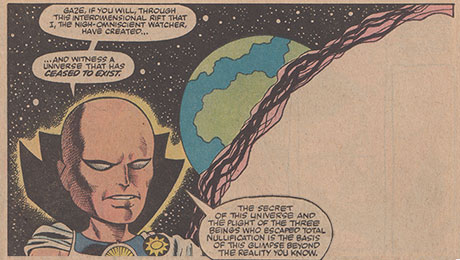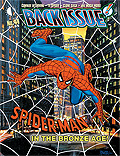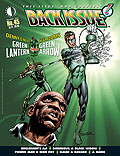Karen: It's been some time since we ran any posts on science fiction and/or fantasy authors, so I thought I'd pull the subject back out of the mothballs to see if we have any interest. In the past we've discussed Andre Norton, Robert Heinlein, John Christopher, Michael Moorcock, Harlan Ellison, Phillip Jose Farmer, Frank Herbert, and J.R.R. Tolkien. If you go to the tag cloud on the left-hand side of the screen and click on "author," they should all come up. If we've somehow missed tagging a post, somebody please feel free to speak up.
Today let's talk about one of the grand old men, Isaac Asimov. Although I can't say he is a favorite of mine, he was my big brother's favorite for many years, so I have some familiarity with his work. I did read some of his robot stories, but never the Foundation books, I'm afraid. By the time I began getting into SF, I was gravitating towards Roger Zelazny, Joe Haldeman, Ursula K. LeGuin, and the like, and not so much the 'hard SF' types like Asimov. But he certainly is a giant in the literature, and his Three Laws of Robotics have had tremendous impact on not only SF but society as a whole. He also took on the role of science ambassador, perhaps less than Carl Sagan, but he still was a witty guest on talk shows. Let us also not forget the magazine that bears his name and has published some wonderful short fiction for many years.
The floor is open...



















































17 comments:
Yeah, I also preferred other SF writers like Le Guin (in particular), Philip Dick or Alice Sheldon (better known as James Tiptree, Jr.). I haven't read much by Asimov in fact: the original I, Robot short story collection (which I really liked), and the first two Foundation novels (which, as a teen, I found a bit dry - I should probably give those another try). More recently, I read a volume of his short stories, most of which I enjoyed. I also have two of his novels ('70s vintage pocketbook editions) that I scooped up for cheap over the past few years, but I still haven't got around to reading them.
Anyway, I can say that what I have read was well-written and usually filled with interesting ideas, if nothing else. And no one can deny the influence exerted by Asimov over the entire field of science fiction. He was not only a very productive writer, but also an editor, and Karen already mentioned the magazine that bears his name. It's also important to note that Asimov was an actual scientist (biochemist) and a prolific popular science writer as well, and he really worked hard to emphasize the "science" in science fiction.
His Robot writings are the ones that have tended to stick with me-- particularly Bicentennial Man (which some folks consider a bit sappy--- but I'm a big ol' sentimental sap. No apologies.).
I know. . . I KNOW. . . I've read the first two Foundation books. In fact, I've read the first one twice. And they haven't stuck with me whatsoever-- which is terribly unfortunate, and really must be a failing on my part. Edo's observation strikes me as true-- they're pretty darned dry, and don't seem to carry that sense of amusing wit that a lot of Asimov's short stories and editorial commentary had.
OMG-- what a mind, though. About 12 times smarter than the best of us. . .
HB
I've read authors like Blish, Heinlein, Clark and Ben Bova, and others I don't recall now but I don't recall ever reading Isaac. It's one of those I'd like to read someday, haven't gotten to it quite yet. I'm most familiar with his heralded name from his various namesake magazines and as a celebrity/science writer, per se.
I recall reading his comments in Starlog and him seemingly being largely acknowledged as that ever-present 'go-to' guy for the critical scientific plausibility comments/reviews regarding space shows like Trek, 1999 and Galactica back in the '70s, like his comments would be some 'litmus test' in the overall science community's acceptance at large.
Actually he was in talks with Glen Larson to come aboard as 'scientific advisor' for BSG's second year which never happened to enhance the show's 'scientific street cred' (long before G1980 was regretfully conceived..).
Roddenberry ended up forming a good rapport with Isaac, sufficient to have him credited as 'scientific advisor' on Trek-TMP and later Trek films. I'd love to see that movie treatment Isaac did on McCartney's request regarding a potential Wings sci-fi film in the mid-70s.
I didn't try some of Asimov's "classic" works (the robot stories; the Foundation books) till my, um, more mature years, and I liked them less than the works I'd read in my teens--perhaps because his writing style left me cold, and I expected more from writers once I became a mature reader. (I read only the first Foundation novel and mostly recall my disappointment that he didn't describe anything, didn't attempt to visualize this marvelous world he had brought to life.)
As a teen, though, I loved his novel The End of Eternity (it's a wild ride) as well as his non-SF mysteries in the first collection of The Black Widowers' Club stories. I had two of his science books as well, but I found them dry going and couldn't make much headway.
I do feel guilty about not enjoying him more given that seven of my short stories (some available through Amazon: http://www.amazon.com/-/e/B008BTWZ1Y) have been published in the magazine that bears his name. He remains a great representative of the field, someone who cared about ideas, scientific knowledge, and the pleasure found in a good tale.
I first read the Foundation trilogy as a college student and have re-read it multiple times since. The first two books were collections of shorter works originally written in the late Forties/early Fifties which may explain the lack of character development and lack of world building. Even though the material is a bit dated,I still consider the original Foundation trilogy as must reading for anyone interested in science fiction. Asimov's later novels where he tied together the Robot tales and the Foundation stories are entertaining but familiarity with his earlier works is almost a must.
Read nearly everything he wrote, and that's an achievement since he wrote volumes on all sorts of things beyond science fiction. Probably the most curious and inventive mind of his peers. If you wrote him a letter--as I did--he wrote back; he was prodigious. I enjoyed his short stories best. He basically invented the science fiction mystery and crime story, in which the solution turned on some element of hard science.
I just checked the "I am not a robot" box. Reluctantly.
I read the original Foundation trilogy plus Foundation's Edge in my first year of university. I enjoyed it then for the bigness of the scope, even though it didn't have the sense of adventure of fantasy series I'd read like the Sword of Shannara by Brooks.
Just a few months ago, I picked up a science paperback by Asimov called Of Matters Great and Small, with science essays from 1973-74. Very enjoyable book, moreso than his novels! He makes science approachable, and you get excited by his enthusiasm. I bought and read two more, and noticed that while I enjoyed the science essays, the brief intros he wrote for the essays were even better-- humorous and personal.
I'm now just about finished his autobiography, "I. Asimov" from '94. Great book and highly recommended! He talks about his early life working in his parents' candy store, reading the pulp fiction they sold there and getting inspired. Later in life he wrote about the galaxies, but was still afraid to fly on a plane! His ups and downs in school, with women, as a teacher and finally a writer and public speaker--he's a great storyteller when it comes to his own life, funny and bright. As he says, it's his favorite subject! If you think Asimov's writing is dry, read this autobiography and I guarantee it will change your opinion of him.
Hiya,
My favorite Asimov's work is "Murder at the ABA". Anybody who can turn Harlan Ellison into an amateur detective is tops.
pfgavigan
"I'm now just about finished his autobiography, "I. Asimov" from '94. Great book and highly recommended!"
Thanks for the rec, Garett. That sounds good.
I'm glad some of you brought up Asimov's personality; I do think he was generally an entertaining personality. I just never got into that sort of 'hard science' SF, which is kind of odd, I suppose, since I went on to a career in science. I'm also glad William Preston showed up -an actual "Asimov's" writer in the flesh! No small feat. I'll add that I've read several of his 'Old Man' stories and enjoyed them quite a bit. Any novel in the works, William?
There was that period during junior high when I tried to get into more serious reading, books instead of comics. I started with Robert E. Howard, then onto Moorcock, Tolkien and finally Asimov's Foundation Trilogy. After a bit, I realized I was reading the same escapist literature I had been reading in comics.
But I will say this about that......I enjoyed the Foundation Trilogy. Perhaps because I read it all during the same summer. The rest of the series I was not that fond of and have yet to pick up the last two offerings.
It does surprise me how comics seem to have become a lynchpin in my life that most of my other memories/experiences float around.
And now for the part where I, once again, go off topic. This past weekend, Stan Lee was at our Comic Convention in Houston. The manager of the Papa John's that is next to where my daughter works met "The Man". He was sharing his pictures with her and her friend during their dinner break. When he got to the picture of Stan Lee, he asked "You know who that is?" And I was so proud when she was able to answer, "Uh, sure! Who doesn't!?!" You gotta raise them right.......
(We had a lot of luck on Venus
We always had a ball on Mars
Meeting all the groovey people
We've rocked the Milky Way so far
We danced around with Borealice
We're space truckin' round the the stars
Come on let's go Space Truckin')
I haven't read any Asimov in 20 years or more, but in high school and right after college I devoured as many of his books I could get my hands on, and my interest in social science was definitely influenced by his "psychohistory."
I think Caves of Steel would make a great film adaptation - too bad there is little love for Asimov on the screen after that miserable I, Robot movie.
Anyway, these days I doubt I'd like his books as much and I bet they are rife with assumptions and unquestioned imperialist/colonialist ideas. .. but maybe I'll pick up Foundation again some day.
Hey William, one of the things Asimov talks about in the autobiography is how much he enjoyed writing non-SF, including the Black Widowers. Congrats on being published in his magazine!
That's a problem with a lot of older SF though, isn't it, Osvaldo? It's a product of its time, mostly, and certain things were unfortunately taken for granted. As a teen, I heard great things about E.E. 'Doc' Smith's Lensman series (it inspired the Silver Age Green Lantern to some degree). I found the first book at a used book store and got home and started to read it, and for the first and only time in my life, wound up throwing the book across the room. Why? I couldn't handle the sexism. I got to a part where it described how only men could be 'lensmen' because women didn't have the mental toughness or willpower to do it. That was it for me.
Now that I'm older, I can sometimes look past such things, but I usually don't even bother. My time is limited, so I read for enjoyment, and there are a lot of current writers I follow who may challenge me, but not with sexism or racism, thanks.
Karen,
One more installment of the "Old Man" series is in the works (as are several other stories); it's been a strange year--no need for details here, but suffice it to say one friend referred to me as "Job"--that's kept me from finishing some stories, but I will be more productive starting . . . now!
And thanks, Garett.
I don't know why it is, Karen, but I think genre fiction, more than "literary" fiction, has been more afflicted--or at least more visibly afflicted--by racism and sexism. (Though I think every English writer in the '30s made clear his or her anti-Semitism.) It likely had as least as much to do with the presumptive audience as with the writers themselves and the larger culture.
Yeah, well I don't mean to say I wouldn't read them again because of the possibility of its thoughtlessness in that regard (to be the most generous I can be about that), but rather that the reading experience would be very different.
Shiz, I think I may just have to squeeze one in this summer now and maybe make a blog post out of it.
Post a Comment